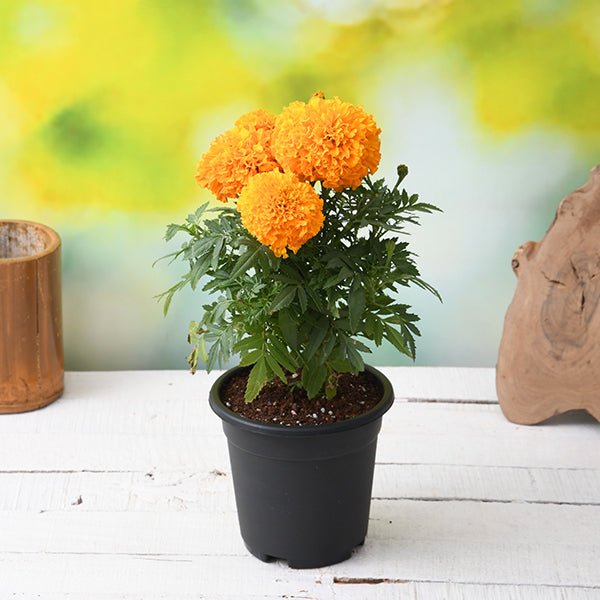
African Marigold (Orange) - Plant
(MRP Inclusive of all taxes)
- Shipping ₹79 for entire order
- Country of origin: India

(MRP Inclusive of all taxes)
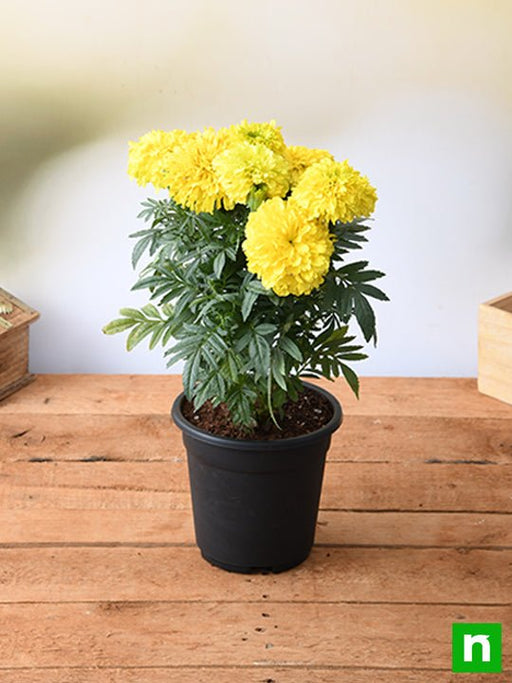
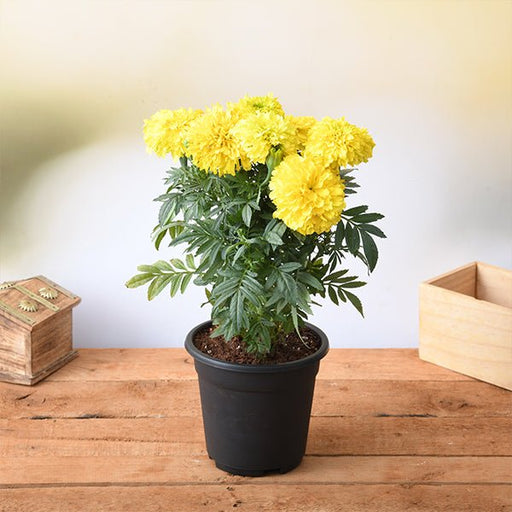 Save 25%
Save 25%
African Marigold (Yellow) - Plant The African Marigold (Tagetes erecta), known for its vibrant yellow blooms, is a stunning addition to an...
View full details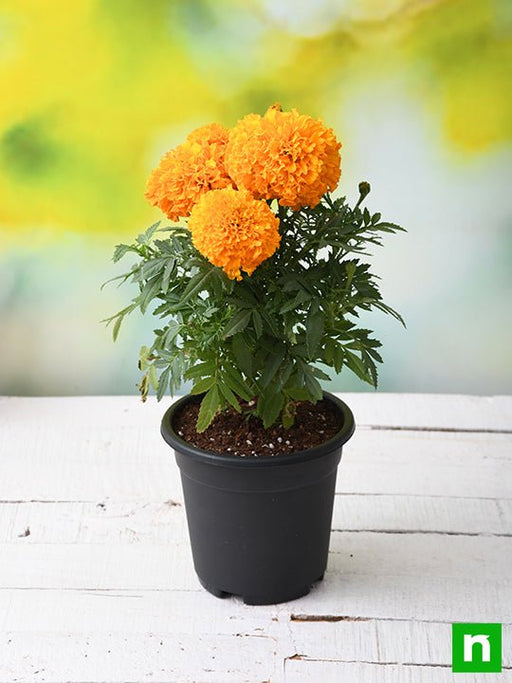
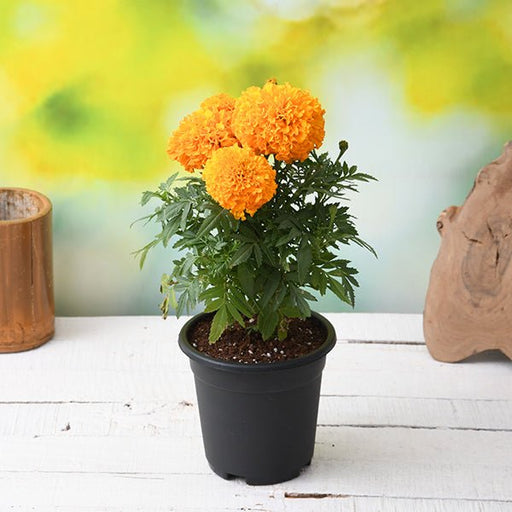 Save 25%
Save 25%
African Marigold (Orange) - Plant The African Marigold (Tagetes erecta), known for its vibrant orange blooms, is a stunning addition to an...
View full details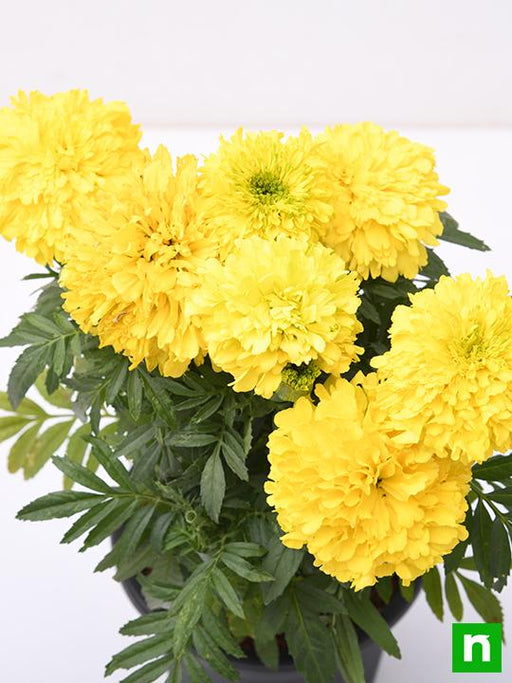
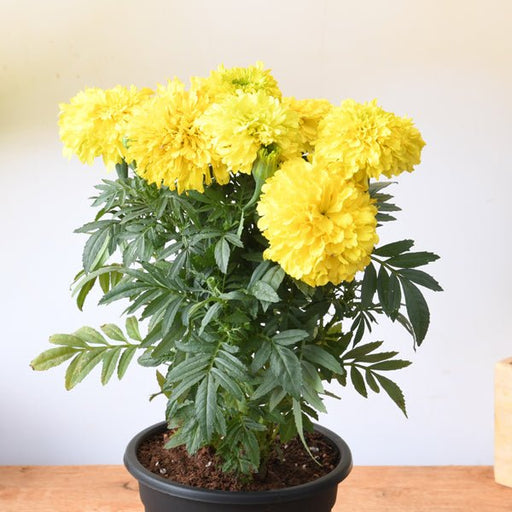 Save 12%
Save 12%
African Marigold (Any Color) - Plant The African Marigold, known scientifically as *Tagetes erecta*, is a vibrant and hardy flowering plan...
View full details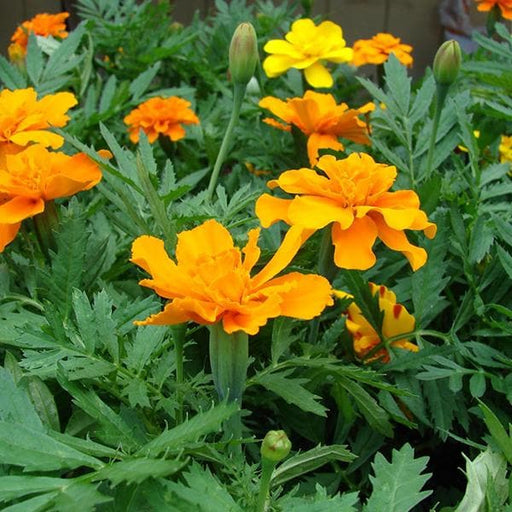 Save 17%
Save 17%
Mexican Marigold - Plant The Mexican Marigold, scientifically known as Tagetes erecta, is a vibrant and hardy flowering plant native to Me...
View full details
 Save 29%
Save 29%
African Marigold (Orange) Plant in 5 inch (13 cm) Pot The African Marigold, known scientifically as Tagetes erecta, is a vibrant and hardy...
View full details
 Save 35%
Save 35%
Celebrate Navratri with 9 Colors Embrace the vibrant spirit of Navratri with our exclusive 'Celebrate Navratri with 9 Colors' plant collection. Th...
View full details Sold out
Sold out
French Marigold (Red) - Plant The French Marigold (Tagetes patula), renowned for its vibrant red blooms, is a stunning addition to any gar...
View full details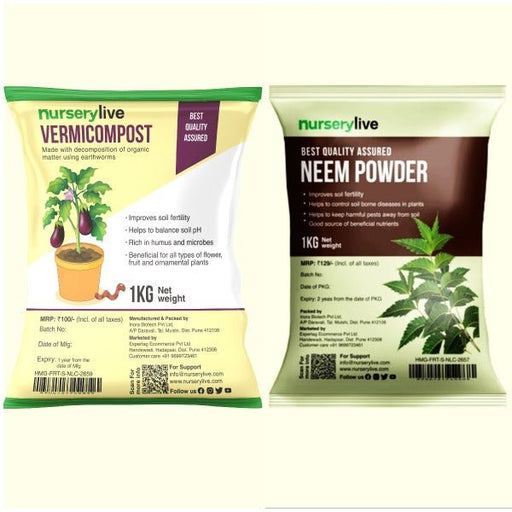 Save 15%
Save 15%
Pack of Vermicompost and Neem Cake for House Plants Transform your indoor garden with our premium Pack of Vermicompost and Neem Cake, spec...
View full details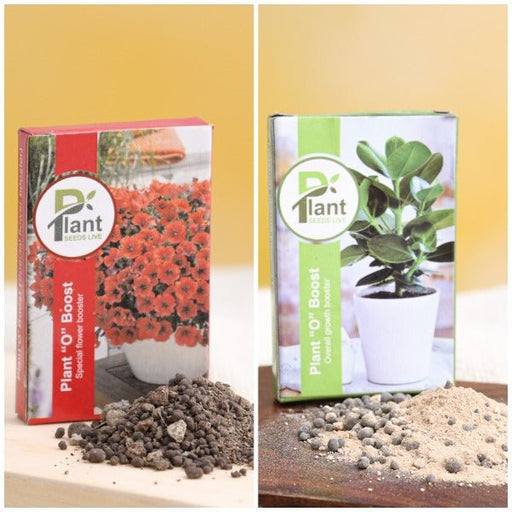
Pack of Plant Growth and Flower Boosters Unlock the full potential of your garden with our Pack of Plant Growth and Flower Boosters! This ...
View full details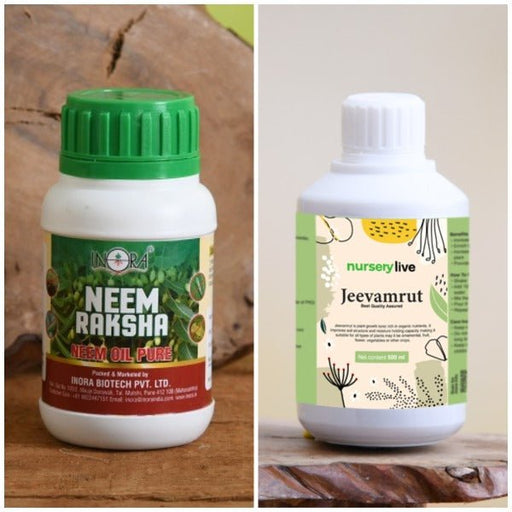 Save 38%
Save 38%
Combo of Jeevamrut and Neem Raksha for Easy Growth and Protection of Houseplants Transform your indoor garden with our exclusive combo of ...
View full details Save 22%
Save 22%
Plant Nutrients Kit (Pack of 16) for a Healthy Garden Transform your garden into a lush paradise with our Plant Nutrients Kit, featuring 1...
View full details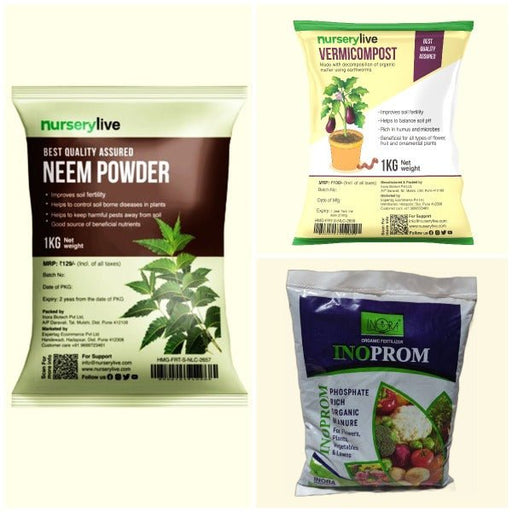 Save 16%
Save 16%
Combo of Top Plant Fertilizers Elevate your gardening game with our exclusive Combo of Top Plant Fertilizers, featuring two bags of premiu...
View full details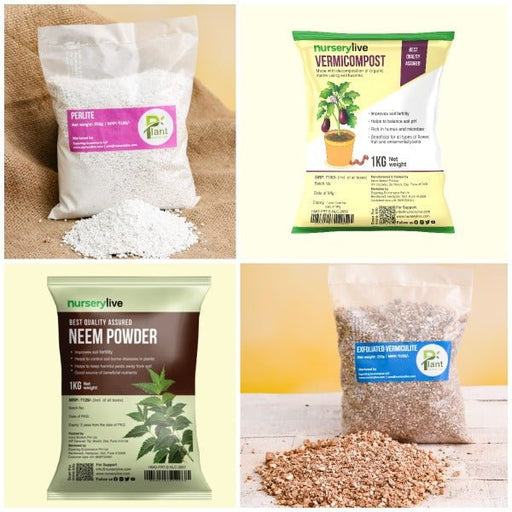 Save 24%
Save 24%
Pack of 4 Additives to Make Soil Healthy and Nutrient Rich Transform your garden into a thriving ecosystem with our Pack of 4 Additives de...
View full details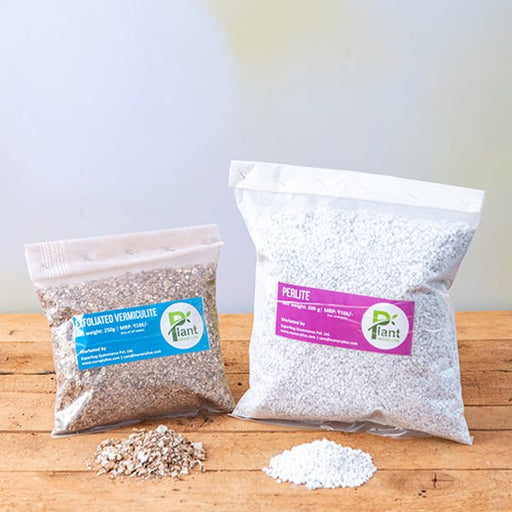 Save 30%
Save 30%
Transform your gardening experience with our premium Combo of Perlite and Vermiculite. This unique blend is designed to enhance soil aeration and ...
View full details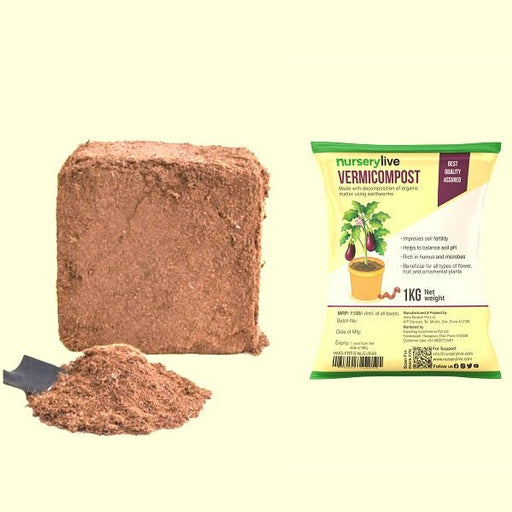 Save 27%
Save 27%
Combo of 2 Vermicompost and Cocopeat - Enrich Your Soil Naturally! Transform your garden into a thriving ecosystem with our Combo of 2 Ver...
View full details
 Save 35%
Save 35%
Best 6 Plants for Perfect Indoor Garden Transform your living space into a lush oasis with our curated collection of the Best 6 Plants for a...
View full details
 Save up to 50%
Save up to 50%
Mini Succulent Garden Pack Transform your space with our Mini Succulent Garden Pack, featuring a delightful collection of 4 any variety beautiful s...
View full details
 Save 30%
Save 30%
5 Best Fragrant Plants Transform your garden or indoor space into a fragrant paradise with our curated selection of the 5 Best Fragrant Plants. Th...
View full details
 Save 24%
Save 24%
Set of 2 Bonsai Looking Grafted Adeniums Transform your indoor or outdoor space with our exquisite Set of 2 Bonsai Looking Grafted Adenium...
View full details Save 45%
Save 45%
Top 4 Die Hard Succulents Pack Transform your indoor or outdoor space with our Top 4 Die Hard Succulents Pack, featuring a curated selecti...
View full details
 Save 30%
Save 30%
5 Best Indoor Plants Pack Transform your living space into a lush oasis with our '5 Best Indoor Plants Pack.' This carefully curated collection fe...
View full details
 Save 25%
Save 25%
Set of 4 Evergreen Air Purifier Plant Pack Transform your indoor space into a lush, green oasis with our Set of 4 Evergreen Air Purifier Pla...
View full details| SrNo | Item Name | Qty |
|---|---|---|
| 2 | African Marigold (Orange) Plant in 6 inch (15 cm) Pot | 1 |
The African Marigold (Tagetes erecta), known for its vibrant orange blooms, is a stunning addition to any garden. This hardy annual thrives in sunny environments, producing large, pom-pom-like flowers that can reach up to 5 inches in diameter. With its rich, golden hue, it not only enhances the aesthetic appeal of your landscape but also attracts beneficial pollinators, making it a favorite among gardeners.
What makes the African Marigold special is its resilience and versatility. This plant is known for its ability to thrive in various soil types and conditions, making it an excellent choice for both novice and experienced gardeners. Additionally, its strong scent acts as a natural pest deterrent, helping to protect your garden from harmful insects.
One of the standout features of the African Marigold is its long blooming season, which lasts from spring until the first frost. This plant not only adds color to your garden but also provides a natural remedy for nematodes in the soil, promoting healthier plant growth. Its vibrant flowers can be used in floral arrangements, adding a touch of sunshine to any setting.
The African Marigold plays a significant role in promoting biodiversity. By attracting pollinators like bees and butterflies, it supports the ecosystem and enhances the overall health of your garden. Additionally, its ability to deter pests naturally reduces the need for chemical pesticides, making it an eco-friendly choice for sustainable gardening.
If you think the African Marigold is just a pretty face, think again! This vibrant flower is a powerhouse in the garden, known for its pest-repelling abilities. Say goodbye to aphids and nematodes, as these golden blooms act like a bouncer at an exclusive club, keeping unwanted guests at bay. Plus, they’re a feast for pollinators, making your garden the hottest spot in town.
Ready to roll up your sleeves? Growing African Marigolds is as easy as pie—if pie were a colorful, sun-loving flower. These beauties thrive in well-drained soil and love a good sunbath. Just plant them in a sunny spot, water them like you’re giving them a spa day, and watch them flourish. They’re the low-maintenance divas of the plant world!
Caring for African Marigolds is like having a pet rock—minimal effort, maximum reward! These resilient plants don’t require much fuss. Just a little deadheading here and there, and they’ll keep blooming like they’re auditioning for a floral fashion show. Water them moderately, and they’ll reward you with a riot of color that’ll make your neighbors green with envy.
Who knew there were so many flavors of African Marigolds? From the classic orange to stunning yellows and even bi-color options, these flowers are like the candy store of the garden world. Each variety brings its own flair, so you can mix and match to create a floral masterpiece that’ll have everyone asking, “Where did you get those?”
The African Marigold isn’t just a pretty face; it’s a multitasker! Use these flowers to brighten up your garden, create stunning bouquets, or even as a natural pest deterrent. They’re like the Swiss Army knife of plants—functional and fabulous. Plus, they can be used in companion planting to boost the health of your other garden favorites.
Want to spread the love? Propagating African Marigolds is as easy as pie—again, if pie were a simple gardening task. You can start them from seeds or cuttings, and before you know it, you’ll have a whole army of these cheerful blooms. Just remember to give them some space to grow; they don’t like to be crowded, much like your introverted friend at a party.
While African Marigolds are great at keeping pests away, they can still attract a few uninvited guests. Watch out for spider mites and whiteflies, who think they can crash the party. But fear not! A little neem oil or insecticidal soap will send them packing. It’s like giving your plants a protective bubble wrap—who wouldn’t want that?
If you want your African Marigolds to thrive, you need to give them the right soil—think of it as their five-star hotel. They prefer well-drained, loamy soil that’s rich in organic matter. A little compost mixed in will have them singing your praises. Just remember, soggy soil is a no-go; these flowers don’t do well with wet feet!
African Marigolds are sun worshippers, and they take their tanning seriously! They thrive in full sun, soaking up those rays like they’re on a tropical vacation. Aim for at least six hours of sunlight a day, and you’ll be rewarded with blooms that are as bright as your summer wardrobe. Just don’t forget the sunscreen—oh wait, they don’t need that!
Looking to create a garden that’s the talk of the town? Pair your African Marigolds with companion plants like tomatoes and peppers. These flowers not only enhance the beauty of your garden but also help improve the health of their neighbors. It’s like hosting a dinner party where everyone leaves feeling fabulous!
you get to enjoy their beauty indoors while making your garden look even more fabulous!
The African Marigold, also known as Tagetes erecta, is a vibrant flower that brings sunshine to your garden. With its bold orange blooms, it’s like nature’s own highlighter! This annual plant thrives in sunny spots and is perfect for adding a pop of color to your landscape or container garden.
Caring for African Marigold is as easy as pie! Just plant them in well-drained soil, water them regularly, and give them plenty of sunshine. They love to bask in the sun like a beachgoer! Deadheading spent flowers will keep them blooming longer, ensuring your garden stays as lively as a summer party.
Get ready for a floral fiesta! African Marigolds typically bloom from late spring to the first frost. With their cheerful orange petals, they’ll light up your garden like a bonfire. Just plant them in the right season, and they’ll reward you with a dazzling display that’ll make your neighbors green with envy.
Absolutely! African Marigolds can be grown indoors, but they’ll need a sunny spot to thrive. Think of them as the sun-loving divas of the plant world. Just ensure they have enough light, and they’ll brighten up your home like a burst of sunshine on a cloudy day.
Yes, indeed! African Marigolds are like the bouncers of the garden, keeping deer at bay with their strong scent. While they may not be completely deer-proof, these vibrant flowers are not on the menu for most four-legged diners. So, plant away and let the marigolds do their job!
While African Marigolds are generally pest-resistant, they can attract aphids and spider mites. Think of them as the party hosts that occasionally attract uninvited guests. Regularly checking your plants and using insecticidal soap can help keep those pesky party crashers in check, ensuring your marigolds remain the life of the garden!
Absolutely! African Marigolds are the ultimate wingmen in the garden. They repel nematodes and other pests, making them perfect companions for vegetables like tomatoes and peppers. Plant them together, and you’ll have a thriving garden party where everyone gets along and flourishes in harmony!
African Marigolds can grow anywhere from 12 to 36 inches tall, depending on the variety. They’re like the tall friends in your group—always standing out! With their sturdy stems and vibrant blooms, they’ll add height and drama to your garden, making it a showstopper that demands attention.
African Marigolds prefer well-drained soil that’s rich in organic matter. Think of it as their five-star dining experience! A mix of loamy soil with compost will keep them happy and healthy. Just avoid soggy conditions, or they might throw a tantrum and sulk instead of blooming beautifully.
Water your African Marigolds when the top inch of soil feels dry—about once a week should do the trick. They prefer a good drink but don’t want to swim! Overwatering can lead to root rot, so keep it balanced, and your marigolds will reward you with a dazzling display of color.
African Marigolds are annuals, meaning they live for just one growing season. But don’t be sad! They’re like the summer fling of the plant world—short-lived but oh-so-memorable. Just plant them each year, and they’ll keep coming back to brighten your garden with their cheerful orange blooms.